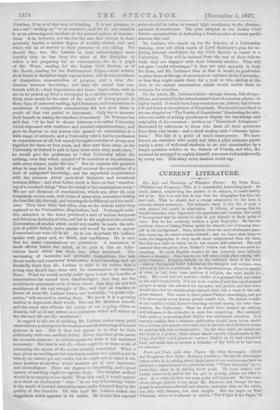CURRENT LITERATURE.
The Life and Teachings of Theodore Parker. By Peter Doan. (Williams and Norgate.)—This is a remarkably interesting book. So. much, indeed, considering the nature of its subject, it could hardly fail to be. But it it only fair to say that the biographer has done his part well. That he should feel a strong admiration for his hero is natural, almost necessary. The intimate study of the life of such a man cannot but result in admiration. It follows, of course, that ho. should denounce very vigorously his opponents and enemies. Nor could it be expected that he should be able to put himself in their point of view. But he has certainly writton a good biography. He has the. cardinal virtue of lotting Parker speak for himself, and of keeping him- self in the background. Once, indeed, when the total-abstinence ques- tion comes up, be cannot contain himself ; and we learn that here, at least, the biographer is very much more enlightened than his hero. But this is a topic on which we do not expect self-restraint. The full extracts that are given from Parker's letters and diaries are most in- teresting. To most English roadere he has certainly been hitherto. almost a stranger. Once known, be will take a high place among reli- gious thinkers. Religion, indeed, in the ordinary sense of the word —that of theological belief influencing the thoughts and actions—was. reduced in him to a minimum. In an eloquent passage, where he speaks of what he had done from motives of religion, the word stands for „ duty. His creed had two articles,—belief in a personal God, and belief in the soul's immortality. It is not to be wondered at if this creed seemed meagre to many who admired his character and genius, and that some should have left his ministrations because they felt a want of the reli- gious element. This seems to have pained Parker exceedingly, and yet. it is what nearly every devout person would fool. We cannot wonder at the hostility which Parker's teaching excited among his own com- munion, the Unitarians. That he should have seemed an entirely evil influence to the orthodox is oven loss surprising. But certainly their mode of expressing their dislike was sometimes atrocious. It is scarcely credible that a religious publication should have taken credit for a certain well-known revivalist that he had cut short Parker's career by praying him into a consumption. On the other hand, we cannot see any harm in a prayer, which seems almost equally objectionable to Mr. Dean, that God would please to convert Parker as ho had converted Saul, and make him as earnest a defender of the faith as be had been an assailant.


































 Previous page
Previous page